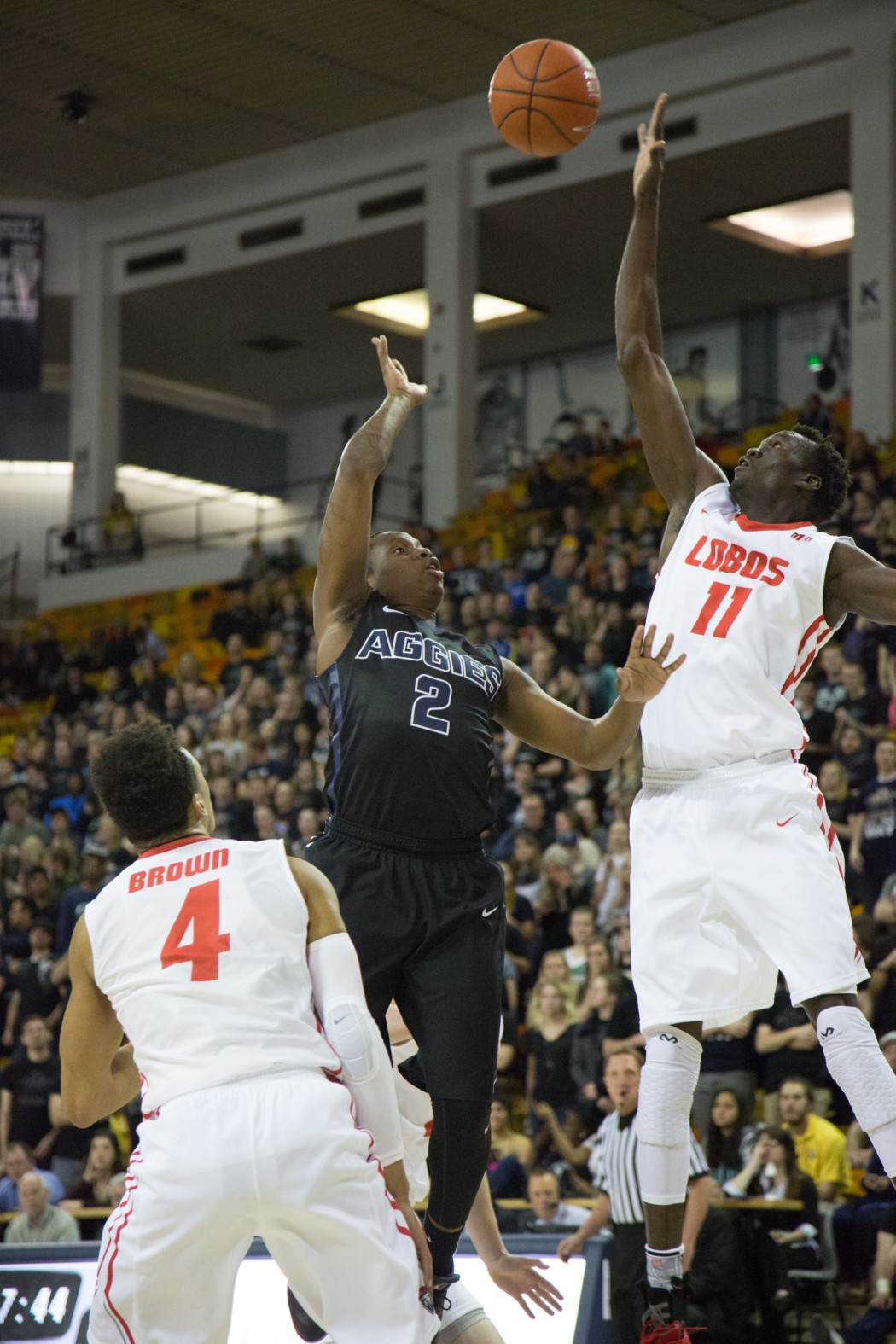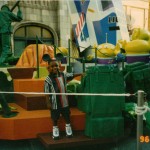Utah State ignites a fire in senior guard Darius Perkins
It was happening again.
In less than 100 seconds, a turnover and a couple of defensive breakdowns by the Aggies had allowed the visiting New Mexico Lobos to trim an eight-point halftime lead to just two points.
At the time, the Utah State men’s basketball team was just 3-8 in Mountain West play and was mired in a five-game losing streak. In nearly every game, a run by the opponent early in the second half had spelled doom for the Aggies. New Mexico, on the other hand, was 7-3 in conference and had pushed undefeated San Diego State to overtime just three days prior.
As head coach Tim Duryea called a timeout to talk to the players, it seemed a stellar first half performance would be for naught because of the same second-half struggles.
Instead, senior guard Darius Perkins took it upon himself to speak up during the timeout.
“I just basically got on everybody,” Perkins said. “I just said what needed to be said.”
The Aggies responded to the senior’s message, holding the Lobos to eight points over the next eight minutes. Utah State went on to win the game, 80-72, leading the entire second half.
“We’d just had enough,” Perkins said. “We were tired of losing and hearing all these things about being a soft team. You don’t want to be associated with things like that.”
“The coaches look to me for leadership,” he said. “I wouldn’t say I sparked the run, but I just said what I had to say and we came out and responded.”
Perkins describes himself as having a laid-back personality – “I was kind of glad to get away from Miami because Miami’s fast and I’m not that type of guy” – but learned to be more aggressive on the basketball court.
“He’s always been very introverted,” said Tony Perkins, Darius’ father. “One of the things that I learned at a very early age with him is that he kind of can express himself through sports, particularly basketball.”
Tony Perkins, a former high school basketball coach and a current basketball scout, raised his son in Fort Myers, a city of just over 60,000 people on the southwestern peninsula of Florida. Described as a “very, very tough” city by Tony, the violent crime rate in Fort Myers is nearly double that of the rest of the state and nearly triple the median rate for the rest of the United States.
To keep Darius out of trouble, his father started a youth basketball team around the time Darius was starting middle school.
“About the fifth, sixth grade I started up a local travel team to try to give him something to do,” Tony said. “[I] wanted to give him something to do to keep him involved and keep him active.”
Basketball came easily for the Perkins family (Tony’s uncle Sam Perkins won a national championship at the University of North Carolina before a 17-year NBA career) and it was natural that the young Darius would eventually begin playing. The sport was challenging at first, though.
“I used to hate basketball,” Darius said. “I didn’t like basketball… I couldn’t shoot or anything so I used to hate going to the court with [my dad].”
Darius continued to work at the sport, playing with teammates like Tim Hardaway, Jr., who currently plays for the NBA’s Atlanta Hawks, and Clive Walford, currently a tight end for the NFL’s Oakland Raiders. By the time he started high school, Darius and his father had moved to Miami, where Darius played for Tony at Monsignor Edward Pace High School.
It was that year when Darius realized his potential.
“My freshman year in high school when I went to a Florida State camp,” Darius said. “I was playing with some older guys and I kind of held my own and that’s when I knew I can play at Division I level. Things started clicking around that time.”
Darius, with his father on the sideline, won the state championship his freshman year. Tony got a coaching job the following year at Chaminade-Madonna College Preparatory School, a small private school near Miami, and Darius followed him there.
Though Darius didn’t realize his basketball potential until high school, recruiters could see it much earlier. As early as eighth grade, powerhouses such as Louisville had taken notice of the young player.
“Darius was initially in the class of 2011 one of the top 10 kids in the country,” Tony said. “He got the invite to all the Nike elite camps, I mean LeBron James, Chris Paul, all the big time camps.”
Worried about the affect it would have on his son, Tony pulled Darius from the AAU team he was playing on.
“I didn’t think he was ready for all of the attention,” Tony explained. “He wasn’t mature enough. He played basketball but I could tell he didn’t have a passion for it so I felt the need to pull him… His recruitment suffered when I moved him away from certain things but in the end I’m glad we did it.”
Following high school, Darius played basketball at Miami Dade junior college to work on his grades. His father could tell Darius wasn’t fully committed, though.
“I don’t think Darius started loving basketball until probably going into his sophomore year in junior college,” Tony said. “I think he was just playing it just to play it and didn’t have an actual love for it.”
Around that time is when everything changed for Darius. As is often the case, the birth of his daughter, Kemani, gave him a new perspective.
“It was crazy. I was playing basketball and I got the call that she was about to be born,” Darius said. “By the time I arrived at the hospital she was already there. They’d already cut the umbilical cord and things so I put the diaper on her. It was a life-changing experience though, because at the time I was going through some things and I was thinking about giving up basketball, but when she got here it changed my whole outlook of things and got me back on the right track.”
Later, Darius caught the eye of Duryea, then an assistant coach for USU, at a junior college showcase. The prospect of playing in the Mountain West intrigued Perkins and he committed to the school after his visit.
Even from across the country, his father could see the positive growth in Darius.
“I could see it in his play,” Tony said. “I could see the change in him just by talking to him. His first year at Utah State I could tell something was a little different. I don’t know if it was Coach Stew [Morrill] or the whole environment at Utah State but I could tell he had a fire in him that was a little different than I had seen in him before.”
Through it all, Darius has maintained a strong relationship with his father.
“I’m very close with my dad,” Darius said. “He’s very inspirational, somebody you need to be around when you’re down because he always lifts me up when I get down on myself. My dad’s a big source of inspiration in my life.”
Even when he needs help on the court, Darius knows who to turn to.
“That’s the only guy I really look forward to turning to, to be honest,” Darius said. “He put the ball in my hands and he got me this far, so why would I change it?”
The two have developed an understanding as Darius has grown. Now, Tony spends most of his time simply being a dad.
“You know he’s always calling me, asking for advice with just basic life questions,” Tony said. “Sometimes it pertains to basketball. And we’ll talk about it but like I said at the end of the day I try to let him make his own decisions… Being that former coach and being Dad, it’s a fine line and I’d rather be Dad and just support him in his efforts.”
While Darius will look to continue playing basketball after his graduation in May, it’s his growth and maturation as a person that will allow him to be successful.
“He’s a very sensitive and humble kid,” Tony said. “Even though he was very popular in high school and stuff, you would always find Darius hanging around kids who aren’t very popular.”
“You know, he’s a hell of a young man,” his father said.
— thomas.sorenson@aggiemail.usu.edu
Twitter: @tomcat340


